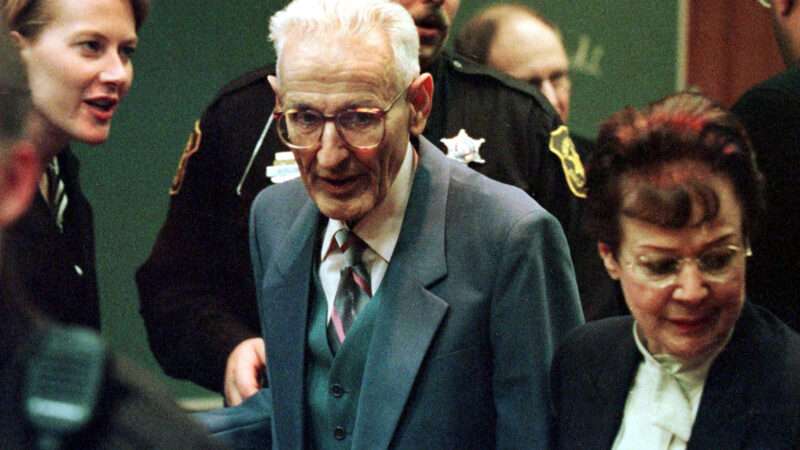
Today marks the 25th anniversary of Dr. Jack Kevorkian's conviction of second-degree murder for performing euthanasia on Thomas Youk, a Michigan man suffering from amyotrophic lateral sclerosis, or Lou Gehrig's Disease. Kevorkian, a medical pathologist, had been defying state laws by engaging in assisted suicide—he claimed to help more than 130 people die—often using machines he invented like the Thanatron (which delivered lethal doses of narcotics) and the Mercitron (which delivered carbon monoxide) and instructing patients how to use them to commit suicide. But this was different. Kevorkian was not assisting a suicide. Kevorkian videotaped himself injecting Youk with lethal chemicals. He was doing all the work. And despite having received Youk's informed consent, the Michigan Court considered it murder.
The United States has come a long way since Kevorkian began crusading to legalize assisted suicide. Today, physician-assisted suicide is legal in 11 jurisdictions: California, Colorado, the District of Columbia, Hawaii, Montana, Maine, New Jersey, New Mexico, Oregon, Vermont, and Washington. One can think of physician-assisted suicide as "active euthanasia" because the physician is providing the means and the instructions, but the patient performs the suicide. "Passive" euthanasia, where a physician or other caregiver ends a patient's life while the patient acquiesces, is illegal throughout the U.S.
Autonomous adults have the right to govern their bodies freely, provided they respect the equal rights of others. Self-ownership includes the right to commit suicide. People have the right to request a physician's assistance to commit suicide. They also have the right to ask a physician to perform euthanasia. Assuming a physician has accurately informed a patient of the prognosis and the patient gave informed consent, the government should not block physicians from respecting the patient's request to end their life.
Active and passive euthanasia are grim exercises for physicians like me who decided to become doctors because we wanted to save lives. But our mission includes doing what we can to ease the physical and emotional pain accompanying illness. Treating illness and ending suffering are often in tension. In painful terminal illnesses, assisting patients to end their lives—end their suffering—can comport with the doctor's creed. Yet many doctors, including myself, might consider the act too objectionable to perform. They can refer such patients to doctors more willing to assist.
The governments in Belgium, the Netherlands, and a few other European countries don't block patients from exercising their right to end their lives and permit physicians to either assist patients or perform life-ending procedures. Similarly, since 2016, Canada has removed government obstacles to active and passive euthanasia, dubbing the practice "Medical Assistance in Dying" (MAID).
Yet there have been several reports of Canadian health care practitioners misusing MAID. In Canada's taxpayer-funded single-payer health system, scarce resources can influence clinicians' behavior. There are documented instances of physicians offering MAID to patients "as though it was one of many standard treatment options." There are confirmed cases of providers offering MAID to Canadian veterans with spinal cord injuries when they tried to get costly resources and care. A July 2023 report by Canadian researchers pointed to "significant gaps in public funding for pharmaceuticals, mental health counseling, and dental care…and long wait times for many publicly funded medical services and disability supports. Patients are therefore being guaranteed MAiD but not mental health care, palliative care, disability supports, and myriad other essential health services." At the peak of the COVID-19 pandemic, one Canadian woman with multiple disabilities but no terminal diagnoses sought MAID because "she simply cannot afford to keep on living."
The government monopoly on the health care system can create perverse incentives for physicians and caseworkers to promote euthanasia over chronic treatment and support.
Ironically, the Canadian government respects people's right to end their lives but not the right to seek health care from a provider outside of the government-run system.
Recently, Canada's Health Minister postponed plans to offer MAID for mental illnesses. The Netherlands has the most experience providing assisted suicide to people with mental health disorders, having done so since the 1990s. But it is much more challenging for health care practitioners to offer euthanasia for mental illnesses than for physical ailments. Even in the Netherlands, practice standards for euthanasia in people with mental illnesses remain controversial and evolving.
For one thing, suicidal ideation can be a symptom of a correctable problem. Should mental health professionals simply agree to end the lives of patients with suicidal ideation, or should they refuse unless the patient first agrees to treatment? And when can a mental health practitioner safely conclude that the mental health problem is irremediable?
Then, there is the matter of determining whether a patient's mental condition impairs decision-making capacity, making informed consent difficult, if not impossible.
There are many thorny medical, psychiatric, and ethical issues that the health professions still need to resolve if they want to be able to help people exercise their right to end their lives without experiencing moral conflict themselves. Lawmakers, too, need to explicitly protect the rights of patients seeking to end their lives and the health practitioners who assist them and establish clear legal boundaries around the issue. However, the principle remains: self-ownership includes the right to end one's life.
Jack Kevorkian died in June 2011 at the age of 83. He had kidney and respiratory failure, and, knowing his prognosis, he refused artificial attempts to prolong his life. His death was reportedly painless. He needed no assistance. In the 1980s and '90s, politicians and pundits often ridiculed him, and he was the subject of stand-up comics' jokes. Some called him "Dr. Death." Others called him "Jack the Dripper." History should remember him as a fighter for patient autonomy and a champion for the "right to die."
The post Dr. Kevorkian Was Convicted of Murder 25 Years Ago Today appeared first on Reason.com.







